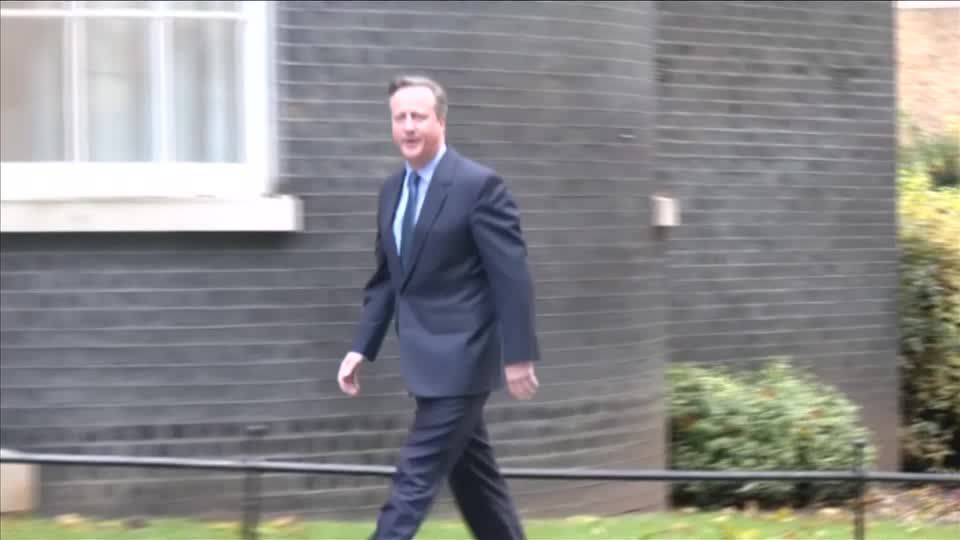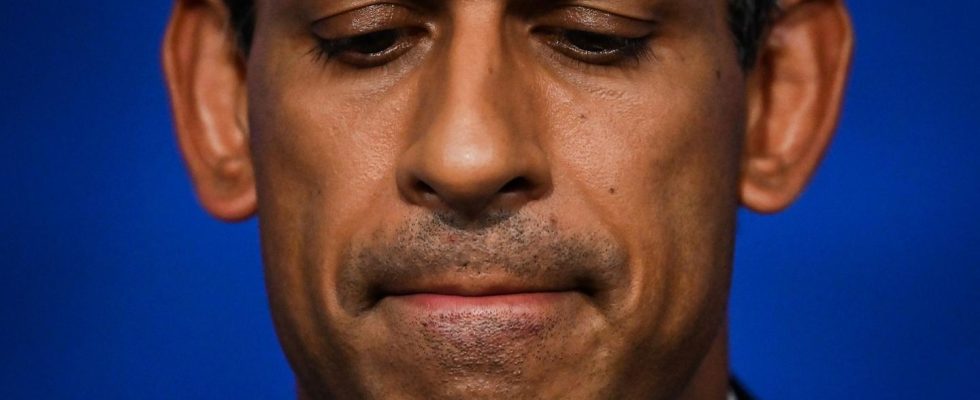Great Britain
“Sunak and the Conservatives need a miracle”: Tories are threatened with an election defeat in 2024
Rishi Sunak has been Prime Minister of Great Britain since October 2022
© Justin Tallis / PA Wire / DPA
The people of Great Britain are expected to elect a new parliament in 2024. Polls predict a major defeat for Prime Minister Sunak’s Conservatives. And then there is a name that causes further concern for the Tories.
Shortly before the end of the year, the British government announced a victory Brexits. As before joining the EU, sparkling wine and wine can again be sold in bottles the size of a pint, i.e. 0.568 liters. The end of EU regulations makes it possible. For some tradition-conscious Brits, this is a success. But it is doubtful whether this change will also give new impetus to Prime Minister Rishi Sunak’s conservative leadership. In the election year of 2024 – a vote is expected in May or autumn – the Tories are threatened with a debacle.
“Sunak and the Conservatives need a miracle,” says political scientist Mark Garnett from Lancaster University. Government polls have long been predicting a landslide defeat. The opposition Labor Party is in the lead by between 15 and 25 percentage points. What also gives the Tories little reason to hope: the gap to the Social Democrats is not shrinking in the long term. In 2023, the Tories never made it above 29 percent – if they achieved this value in the election, it would be their worst result in history, the online newspaper “i” reported.
The wounds of the past
Two names in particular are associated with the decline: Boris Johnson, who alienated voters with lies, the quagmire of the “Partygate” affair and the appearance of nepotism. And his successor Liz Truss, the Prime Minister with the shortest term in office in history, who plunged the economy into chaos with adventurous announcements – many Brits are still suffering from that today. After almost 14 years of conservative governments with a total of five prime ministers, many Brits have had enough.
Incumbent Sunak, who presents himself as a candidate for a new beginning even though he was already in government, cannot stop the downward spiral. Even in the EU, very few people are relying on Sunak: the federal government is reportedly not expecting the Prime Minister to make an inaugural visit. Rather, they are in the process of forging stronger ties with Labor.
Five promises – only one is fulfilled
Sunak has not yet found an issue with which he could bring a broad mass of people back to his side. In the spring he will probably announce tax cuts and the inheritance tax will probably be scrapped, British media reported. The 43-year-old made five promises a year ago by which he wanted to be measured. At most, one thing is true: inflation has more than halved. But economists emphasize that it is less Sunak who is responsible for this and more the improved global economic situation.

Things are looking bad for the remaining “pledges”: the economy is stagnating, national debt is not falling and waiting times for the NHS have even continued to rise. Irregular migration has fallen slightly, but the backlog of asylum applications is far from being cleared.
Sunak is not a speaker like Johnson, he doesn’t get people carried away during his appearances. Rather, the son of a doctor and a pharmacist appears like the investment banker he once was. His great wealth and his penchant for traveling even short distances by helicopter reinforce the image of the aloof politician.
Quarreling Tories
Sunak promised “integrity, professionalism and accountability at all levels” when he took office a good 14 months ago. After the scandals under Johnson, the country hoped for stability. But the Tories themselves are still causing the biggest stir. Internal party problems distract from government plans. Home Secretary James Cleverly recently had to apologize for a joke about knockout drops. Only recently had the government announced new measures against “spiking” – the misuse of co-drops.
New Prime Minister
Rishi Sunak is reshuffling the British cabinet – with some old acquaintances
The Tories don’t always pull together politically either. Before Christmas, Sunak was able to avert a revolt from the right against his asylum policy. But the issue is likely to continue to heat up in the new year. The right-wing conservatives have allegedly received promises – which the moderates in turn reject. A compromise? Not in sight.
“Sunak’s biggest challenge at the start of the year is to avoid divisions in his party,” says expert Garnett. Many MPs no longer cared about public loyalty. “They think the next election is already lost,” Garnett says. Dozens of MPs have already announced that they will not run again. We can hear that the remaining Tories are already fighting hard for the last constituencies that are considered safe.
Another change in leadership?
Political scientist Garnett does not rule out that there could actually be a change in leadership again. “Many Tory MPs see a new leader as potentially the party’s last chance,” he says. In background discussions there is lively speculation about possible successors to Sunak – but especially about the role of an opposition leader after the election.
The names of Economics Minister Kemi Badenoch, former Interior Minister Suella Braverman and former Migration State Secretary Robert Jenrick, all of whom belong to the right wing of the party, have long been mentioned. Experts expect the Tories to move even further to the right after an election defeat.
The threat from the right in Britain
They are already struggling with the poll success of the right-wing Reform UK party – once founded as the Brexit Party, which became the strongest force in Great Britain in the 2019 European elections. After being marginalized for a long time by the Tories, the right-wing populists are now polling at up to ten percent. Even if they have little chance of winning seats in the British majority voting system, they are likely to cost the Tories votes.
The prime minister could even be replaced by a right-wing populist: Brexit champion and reform co-founder Nigel Farage has been flirting with rejoining the Conservative Party for weeks – and when asked, has not ruled out taking over the leadership.

